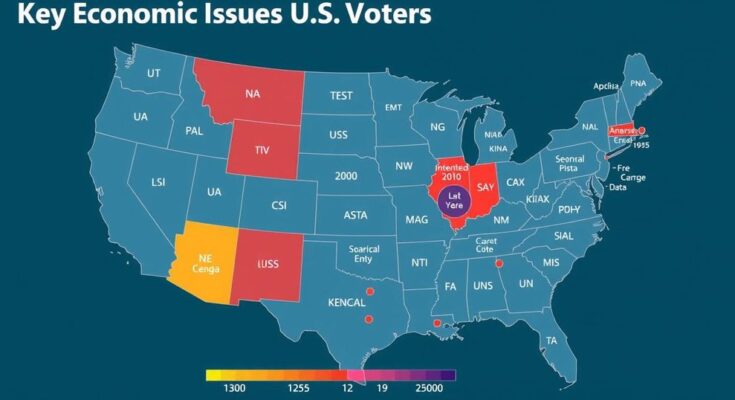In the lead-up to the November election, economic issues dominate voter concerns, prominently featuring inflation, job market health, immigration policy, tax reforms, and national debt. Despite some improvements, many Americans feel economically worse due to inflation and stagnant wages. The candidates’ approaches to these issues will be crucial for influencing voter perceptions and electoral outcomes.
As the November election approaches, economic concerns loom large for American voters, prompting both Vice President Kamala Harris and former President Donald Trump to make compelling cases for their fiscal strategies. Despite expert assessments rating the economy positively, public sentiment reveals a stark contrast, with over half of Americans feeling worse off than four years ago, influenced by partisan views and the lingering effects of the pandemic-related disruptions that fueled inflation. “It’s inflation, stupid!” noted economist Bernard Yaros, emphasizing that inflation will heavily influence voter decisions this election. Inflation remains the top concern, even as rates drop significantly from their peak. The Consumer Price Index saw a decrease to 2.4% in September, yet many Americans still perceive prices as excessively high. Over 25% of people surveyed estimated current inflation rates over 10%, highlighting ongoing struggles with the reality of rising costs, like groceries which, despite a modest rise of only 1.3%, have skyrocketed overall since early 2020. Yaros warns that voter perception of inflation will shape Electoral College outcomes drastically. The labor market appears robust, with unemployment rates near historic lows, and wages accelerating faster than inflation since May 2023. However, long-standing inequalities plague the landscape, especially among white men without college degrees, who have seen declining economic fortunes over decades. Surveys indicate these workers tend to view the economy negatively and show strong support for Trump, highlighting their particular economic vulnerabilities in the current climate, with many strategizing based on educational attainment and economic outlook. Immigration is another pivotal issue, with Trump ramping up his rhetoric against the Biden-Harris administration’s policies. His claims of a massive deportation strategy could spell economic doom, as over 11 million undocumented immigrants contribute significantly to the workforce, especially in infrastructure-heavy sectors. President of the Peterson Institute, Adam Posen, warned that mass deportations would trigger economic troubles, costing taxpayers tremendously while exacerbating existing economic strife. Taxation has become a focal point in the election battle, with both candidates proposing various tax cuts aimed at different demographics. Trump promises broad tax cuts, including eliminating taxes on tips, while pushing for reducing corporate tax rates significantly. However, the future of the 2017 Tax Cuts & Jobs Act hangs in the balance, as any changes would require navigating a potentially divided Congress, hindering legislative efforts. The national debt and deficit continue to grow, fueling concerns for the candidates’ economic plans that are projected to add trillions to taxpayer burdens. With current debt levels nearing 99% of GDP, projections for growth highlight an alarming fiscal outlook. Voters in pivotal battleground states overwhelmingly express the desire for a concrete plan to tackle rising national debt, making it a crucial consideration in their voting decisions.
As the upcoming elections draw near, economic issues are dominating voter concerns, particularly inflation, job stability, immigration, taxation, and national debt management. Political discourse has intensified as both leading candidates adapt their rhetoric and policies to address these priorities, reflecting the anxieties and expectations of the American electorate. Understanding the nuances of these issues can clarify how they might influence voter behavior in a politically polarized landscape.
Voter concerns around economic stability are sharply defined, with inflation leading the charge as the primary factor affecting decisions. Additionally, a strong job market and wage growth have not erased the struggles faced by various demographic groups, especially those lacking higher education. Immigration and tax policy remain pivotal issues, alongside the looming threat of national debt, shaping the contentious election narrative. Ultimately, a clear voter plan addressing these economic impediments may sway outcomes significantly.
Original Source: www.cbsnews.com



